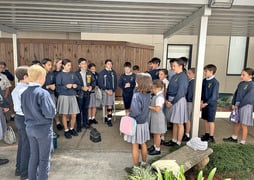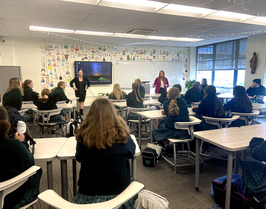
A platform that encourages healthy conversation, spiritual support, growth and fellowship

NOLACatholic Parenting Podcast
A natural progression of our weekly column in the Clarion Herald and blog

The best in Catholic news and inspiration - wherever you are!
Counselors work together to guide teens
-

By Christine Bordelon
Clarion Herald
For a while now, the Department of Catholic Education and Faith Formation (DCEFF) has coordinated group meetings with counselors at Catholic schools enabling sharing opportunities as counselors work to maintain student mental health in the post-COVID environment.
Sister of Mount Carmel Mary Ellen Wheelahan, the archdiocesan safe environment coordinator, works closely with the DCEFF and has been fine-tuning, through these quarterly meetings, the best ways to address school counselor needs. Organizing speakers that counselors have requested and conducting days of training on subjects such as responding to trauma and active shooters have been among the tactics.
 “We’re focusing on specific issues that they need and spending more time with counselors sharing with each other,” Sister Mary Ellen said.
“We’re focusing on specific issues that they need and spending more time with counselors sharing with each other,” Sister Mary Ellen said.
“That’s where the knowledge is. Finding the knowledge and experience of individual teachers and counselors is worth gold.”
Picking their brains
Counselors from St. Edward the Confessor Elementary School in Metairie, Jesuit High School and Mount Carmel Academy recently shared the strategies that grew out of the ideas gained from fellowship with other counselors and how they responded to mental-health challenges in students since COVID-19.
Denise Flynn ([email protected]), a counselor at St. Edward the Confessor, said her pre-K students, ages 3 and 4, were most affected and are learning to re-socialize and cooperate together. Due to an increase in tantrums and behavioral issues, St. Edward has created activities that promote sharing and compromise among students.
Flynn said other Catholic elementary schools are experiencing similar challenges.
“Our teachers need support,” Flynn said, adding that St. Edward has classroom assistants through first grade. “We try different approaches in a compassionate way. We started to create more clubs for students in third grade and up. We have more outlets after school for students to be with their peers that are run by teachers.”
Examples include a LEGO Club, robotics group, a flag football team for fourth graders, inviting younger students to get involved in morning patrol and the 65-member pro-life group that does service work.
“To let them see others who are different than they are and feel good about helping them and recognizing a need in the community,” is important, she said. “We encourage them to get involved when they go to high school.
While the new initiatives may be stretching the teachers more than usual, they have helped students.
“It’s balance,” Flynn said. “It’s support of each other (to) be there for each other. Kids and parents are very appreciative.”
Flynn is part of a cohort of four or five Catholic school counselors who check in monthly with Zoom and have conversations on how to help kids.
More time with students
At the high school level, having multiple counselors on hand helps students get access to someone to talk to more often. Counselors meeting with their counterparts at other schools also has been meaningful.
“It’s really valuable to be able to talk and see what schools might be doing,” said Jesuit guidance and junior counselor Justin Genovese ([email protected]). Genovese is also Student Council moderator, so he’s plugged into the social aspect of student life as well as the spiritual and mental health of students. He considers high school a microcosm of the country and society.
“Knowing how rough it was during that COVID year and seeing the effects in all three phases … trying to rebound on the mental health side … we’re seeing more stress, more requests for counselors, more than usual signs of depression,” Genovese said. “We’re calling parents and telling them we think their son is showing signs of depression … We saw an uptick on it.”Genovese considers Jesuit well-positioned to help students with a total of 10 counselors (five grade-level counselors, three college counselors and even a wellness counselor who coordinates important discussions on such things as suicide). He started to see things become more normal in the fall of 2022 when all students were back on campus without hybrid classes and football returned.
Presentations by Teen Life Counts are held as early as freshman year to encourage students to speak up about friends they may be worried about. Jesuit also has seen success in its peer support program in which upperclassmen visit the classes of younger students quarterly and present different topics.
“We understand the value of having a guy they look up to instead of a counselor or their parents,” Genovese said.
Having Jesuit’s weekend retreats return, as well as the 100 hours of community service, were huge catalysts in reaching students socially and religiously.
Genovese said Jesuit Father John Brown, the school’s president, likened the post-COVID recovery to “an archer pulling back” on the bow.
“And, last year, it came back,” Genovese said. “The football team was good. It was fireworks.”
He said Jesuit and Mount Carmel have seen young parents die at a higher rate than usual and created a grief group for students who may have lost a parent.Girls are vocal
Mount Carmel counselor Scott Reason ([email protected]) and his seven fellow counselors have handled well how the girls may have needed a little more attention. Although, at girls’ schools, he said, female students are rarely shy about verbalizing how they are feeling.
“That’s the beauty of this ministry,” Reason said. “Catholic educators and counselors have that connection to the bigger mission.”
COVID precautions had Mount Carmel celebrating televised Mass in classrooms and conducting more retreats with smaller groups.
Reason said it’s hard to pinpoint some student difficulties as COVID-related.
“We live in a world that fosters anxiety, so there is no surprise that we see anxious students,” he said. “Is that COVID or just part of the world we live in – that disconnect? What we try to do to attend to it is that personal approach – having as many counselors attending to the individual needs of our students. Ultimately, we do parent meetings, safe environment and suicide prevention presentations.”
This 2022-23 school year saw things return to normal with regular dances, holding retreats at the same pace and having all students back on campus without all the COVID restrictions in place.
“Though, there are those residual effects for kids who didn’t have the ability to process what was going on,” Reason said. “In an all-girls’ setting, they are particularly verbal and articulate their needs. There is usually no want for them having to ask for assistance. … It was hard to find the additional support off-campus.”
Reason said encouraging meaningful service hours is also important.
“The service component transcends that obligation,” Reason said. “We shouldn’t just check a box but find something that will be meaningful in their life. … In turning outward, students found some of what is missing in their life. It helps them help others in need.”
Both Genovese and Reason have found worth in the speaker sessions by the Department of Catholic Education and Faith Formation.
“The opportunity to network and exchange ideas – that’s probably the most helpful,” Speaker said.
The Department of Catholic Education and Faith Formation sends out notices to counselors if something happens on a campus and there is a need for additional counselors. School counselors are always eager to lend a hand to other schools and did so recently at St. Margaret Mary, St. Peter’s, Pope John Paul II, Archbishop Rummel and St. Matthew the Apostle.
“Everybody has a different issue, and counselors bring their expertise to it,” Sister Mary Ellen said. “We’re there to support the teachers. Counselors are very good at identifying and addressing issues immediately and compassionately.”
“The driving influence is we’re there to be Christ’s hands and feet,” Reason said. “We can do that by immediately reaching out – getting that student in the classroom. And we can address it no matter what else is going on. It’s in those moments that we are made aware of those significant needs that nothing else is as important as being with that student in that moment.
“Programs are great, but it’s the relationships that are in the heart of all this. That’s what Jesus did – he related to people. Our ability to be present to them and relate to them as often as we can is the most fundamental thing in helping address the needs they are expressing.
[email protected]




